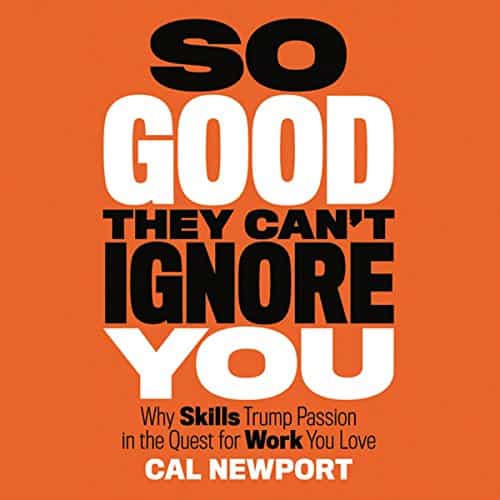So Good They Can’t Ignore You by Cal Newport | Summary
The path to happiness goes much further beyond the simple question of “What should I do with my life?” In his book, So Good They Can’t Ignore You: Why Skills Trump Passion in the Quest for Work You Love, Cal Newport discusses what he learned from trying to answer the following question:
“Why do some people end up loving what they do, while so many others fail at this goal?”
Buy So Good They Can’t Ignore You on Amazon

So Good They Can’t Ignore You by Cal Newport
Why Skills Trump Passion in the Quest for Work You Love
Download The PDF Book Summary For So Good They Can’t Ignore You
Rule #1: Don’t Follow Your Passion
Rule #1 states that “follow your passion” is terrible career advice, which provides the foundation for everything that follows in this book.
Chapter One: The “Passion” Of Steve Jobs
This chapter of So Good They Can’t Ignore You “questions the validity of the passion hypothesis.” Despite being popular, the passion hypothesis is “wrong and potentially dangerous:
The Passion Hypothesis – “this hypothesis claims that the key to occupational happiness is to first figure out what you’re passionate about and then find a job that matches this passion”
The evidence does not support that most have pre-existing passions within them that are waiting to be discovered. This belief will result in sadness and confusion when the reality of following one’s passion does not come to fruition.
Chapter Two: Passion Is Rare
This chapter of So Good They Can’t Ignore You “argues that the more you seek examples of the passion hypothesis, the more you recognize its rarity.”
“Compelling careers often have complex origins that reject the simple idea that all you have to do is follow your passion.” Cal Newport shares the following three scientific conclusions for why some are satisfied with their work while many others are not:
- Career Passions Are Rare: A survey found that 84% of Canadian college students identified personal passions, but less than 4% of them were related to work or education.
- Passion Takes Time: The most passionate workers did not follow their passion into a job but instead stayed in their work or industry long enough to master what they did.
- Passion Is a Side Effect of Mastery: The Self-Determination Theory shows us why which pursuits motivate people in their work:
Self-Determination Theory (SDT) – the idea “that motivation, in the workplace or elsewhere, requires that you fulfill three basic psychological needs:
- Autonomy – the feeling that you have control over your day and that your actions are important
- Competence – the feeling that you are good at what you do
- Relatedness – the feeling of connection to other people”
Thus, when you become better at what you do, you will feel accomplished and work toward career success. Further, you will be rewarded with more control over your responsibilities.
Chapter Three: Passion Is Dangerous
This chapter of So Good They Can’t Ignore You “argues that subscribing to the passion hypothesis can make you less happy.”
From 1987 to 2010, US job satisfaction has trended downward from 61% to 45%. Amongst young people, 64% are unsatisfied with their work, which is the highest ever recorded.
“The passion hypothesis is not just wrong, it’s also dangerous. Telling someone to “follow their passion” is not just an act of innocent optimism, but potentially the foundation for a career riddled with confusion and angst.”
If “follow your passion” is actively bad advice, the following three rules will answer the follow-up question of “what you should do instead?”
Rule #2: Be So Good They Can’t Ignore You (Or, The Importance Of Skill)

Rule #2 states that “the traits that define great work are rare and valuable. If you want these traits in your own life, you need rare and valuable skills to offer in return.”
Chapter Four: The Clarity Of The Craftsman
This chapter shows you why skills trump passion. Newport presents two different ways to think about work: the Craftsman Mindset and the Passion Mindset. “Most people adopt the Passion Mindset, but this chapter argues that the Craftsman Mindset is the foundation for creating work you love.”
Cal Newport discusses an interview done by comedian Steve Martin who was asked how to make it in a difficult industry such as comedy. He answered that you should “Be so good they can’t ignore you.” The relentless focus on constantly improving and producing results is known as the Craftsman Mindset:
The Craftsman Mindset – an approach to your working life in which you focus on the value of what you are offering to the world
This approach is “crucial for building a career that you love.” In contrast, most people approach their work using the Passion Mindset:
The Passion Mindset – an approach to your working life in which you focus on the value your job presents to you, which results in perpetual sadness and confusion for the following reasons:
- Focuses on what your work gives you causes you to become very aware of what you dislike about it.
- Poses deep questions (“Who am I?” and “What do I genuinely love?) that are impossible to clarify and confirm.
“Regardless of how you feel about your job right now, adopting the craftsman mindset will be the foundation on which you’ll build a compelling career.” So instead of questioning whether you have passion for your work, focus on becoming so good they can’t ignore you.
Chapter Five: The Power Of Career Capital
This chapter “argues that the traits that make a great job great are rare and valuable, and therefore if you want a great job, you need to build up rare and valuable skills to offer in return.”
First, Cal Newport identifies the rare and valuable traits that produce great work, including creativity, impact, and control. Then, he argues that you should adopt the Craftsman Mindset to get the skills or build Career Capital to offer in return for these traits:
Career Capital – the rare and valuable skills within the working world, which is “the key currency for creating work you love”
Cal Newport codifies his theory of Career Capital for this chapter as follows:
The Career Capital Theory of Great Work – “this theory claims that the key to work you love is not to follow your passion, but instead to get good at something rare and valuable, and then cash in the Career Capital this generates to acquire the traits that define great jobs
Thus, you should adopt the craftsman mindset to acquire career capital, as its specific goal is to “be so good they can’t ignore you.” In contrast, following the passion mindset will be ineffective and work against creating the work you love. Unfortunately, many authors and online writers are precariously promoting a version of the passion hypothesis, known as Courage Culture:
Courage Culture – “the idea that the only thing standing between you and a dream job is building the courage to step off the expected path” of “other people’s definition of success” and follow your own dreams
Though well-intentioned, Courage Culture dangerously undermines the need to acquire sufficient career capital to support your career goals. The result is many leave their current job and to be much worse off.
To determine if whether you are in a position that will help apply the Craftsman Mindset and build your Career Capital, Cal Newport lists the following three disqualifiers for your job:
- Presents few opportunities to distinguish yourself by developing relevant skills that are rare and valuable.
- Focuses on something you think is useless or perhaps even actively bad for the world.
- Forces you to work with people you really dislike.
These disqualifying traits can prevent you from building and investing your career capital. If it satisfies the first disqualifier, then skill growth is not possible. If it satisfies the second or third disqualifier, then it will be tough for you to stay in your position to achieve this goal.
Download The PDF Book Summary For So Good They Can’t Ignore You
Chapter Six: The Career Capitalists
This chapter of So Good They Can’t Ignore You “demonstrates the power of career capital in action with two profiles of people who leveraged the craftsman mindset to construct careers they love:”
- Alex Berger: He broke into Hollywood to be a successful TV writer who loves his work.
- Mike Jackson: He became a cleantech venture capitalist who also loves his work.
The reality of each of their stories is that both men focused on “becoming so good they can’t ignore you” instead of finding their passion. This process generated career capital, which both used to attain the rare and valuable traits that made their careers amazing.
Chapter Seven: Becoming A Craftsman
This chapter of So Good They Can’t Ignore You “introduces deliberate practice, the key strategy for acquiring career capital, and shows how to integrate it into your own working life.”
Cal Newport starts by comparing himself to Jordan Tice as a guitar player: “The difference in strategy that separates average guitar players like me from stars like Tice and Casstevens is not confined to music.” The key to successfully acquiring career capital, a concept widely explored in other habit books, is the following rule:
The 10,000-Hour Rule – “the idea that excellence at performing a complex task requires a critical minimum level of practice surfaces again and again in studies of expertise”
Originally known within performance science, the rule quantifies the amount of practice time required for a habit to master a skill. Recently, Malcolm Gladwell popularized it in his book, Outliers, discussing that you need the right circumstances to gain a massive amount of practice.
However, “if you just show up and work hard, you’ll soon hit a performance plateau beyond which you fail to get any better.” To break the plateau and successfully adopt the craftsman mindset, you should approach your work with a dedication to deliberate practice:
Deliberate Practice – the style of difficult practice that requires you to stretch outside your comfort zone and then receive ruthless feedback on your performance”
In career growth, many knowledge workers avoid developing relevant skills because it is uncomfortable. However, to build up large amounts of career capital, you should make deliberate practice a habitual part of your work routine.
Cal Newport shows you how to apply deliberate practice in your knowledge works using the five traits of a Craftsman:
- Decide What Capital Market You’re In:
- Capital Market – the market you are trying to acquire career capital in:
- Winner-Take-All Market – a market with “only one type of career capital available and lots of different people competing for it”
- Auction Market – a less structured market with “many different types of career capital, and each person might generate their own unique collection of this capital”
- Identify Your Capital Type:
- Winner-Take-All Market: You need to master the one type of capital or skill that matters.
- Auction Market: There is flexibility in the type of capital that you can build. You can create different combinations of skills to emphasize your rareness.
- Look for Open Gates, which are the few “opportunities to build capital that are already open to you,” which get more career capital at a faster rate.
- Define “Good”: Establish SMART goals as “if you don’t know where you’re going, then it will be tougher to take effective action.” For more, check out The 12 Week Year (book summary).
- Stretch and Destroy: Focus and stretch beyond your comfort zone, as “deliberate practice is often the opposite of enjoyable.”
- Be Patient: Adopt this style of 10X diligence, as acquiring capital can take time. Be willing to reject shiny pursuits, as these will derail your ability to gain the capital you need.
“If you can introduce this strategy into your working life, you can vault past your peers in your acquisition of career capital.” For more on deliberate practice, check out Cal Newport’s book on Deep Work (book summary).
Rule #3: Turn Down A Promotion (Or, The Importance Of Control)

Rule #3 “argues that gaining control over what you do and how you do it is incredibly important.” This attribute is very apparent in those people who have found their dream job.
Chapter Eight: The Dream-Job Elixir
This chapter of So Good They Can’t Ignore You “argues that control over what you do, and how you do it, is one of the most powerful traits you can acquire when creating work you love.”
You need to get good before you can expect good work. Thus, invest your (extensive) career capital into gaining one of the most important traits of Control (Dream-Job Elixir) over your work:
Control – the trait of having power in what you do and how you do it
In his book Drive, Dan Pink discusses how control has resulted in an overall better life in terms of better academic results, physical performance, increased productivity, and greater occupational happiness. Within the workplace, the power of control is embodied in a new philosophy called ROWE:
Results-Only Work Environment (ROWE) – the corporate philosophy that shows the power of control by emphasizing that all that matters is your results
Companies that have embraced ROWE have focused on their employees’ results while time spent in the office, vacations days used, and email responses sent are irrelevant. Instead, this philosophy empowers the employee to figure out how to get the important things done and produce results.
“Giving people more control over what they do and how they do it increases their happiness, engagement, and sense of fulfillment.”
Chapter Nine: The First Control Trap
Investing your capital in control can be tricky. This chapter of So Good They Can’t Ignore You introduces the first of two control traps that can prevent people from achieving this trait. The First Control Trap is as follows:
The First Control Trap – “the principle that control that is acquired without career capital is not sustainable”
Control is powerful, but you need something valuable to offer in return for this powerful trait. If you embrace control without enough career capital, you will probably end up frustrated by “enjoying all the autonomy you can handle but unable to afford your next meal.”
Download The PDF Book Summary For So Good They Can’t Ignore You
Chapter Ten: The Second Control Trap
This chapter of So Good They Can’t Ignore You introduces the Second Control Trap. When no one pays attention to your work, you probably don’t have sufficient career capital to do exciting work. Ironically, when you do build up the capital necessary to acquire real control, you fall prey to the Second Control Trap:
The Second Control Trap – “the principle that when you acquire enough career capital to acquire meaningful control over your working life, that’s exactly when you’ve become valuable enough to your current employer that they will try to prevent you from making the change”
When you acquire more control in your work, it benefits you but usually does not benefit your employer, resulting in conflict. Your employer will resist your attempts to gain control and may get you to reinvest your capital back into your work at their company. Instead of gaining control, you may be rewarded with a higher salary, prestige, and more responsibility.
“Courage is not irrelevant to creating work you love. … The key, it seems, is to know when the time is right to become courageous in your career decisions.” The right timing will result in a great professional life, while the wrong timing may get you caught in the First Control Trap.
Chapter Eleven: Avoiding The Control Traps
This chapter of So Good They Can’t Ignore You introduces the Law of Financial Viability. When pursuing control, the ensuing control traps may cause you to encounter resistance. “How can you tell if this resistance is useful (for example, it’s helping you avoid the first control trap) or something to ignore (for example, it’s the result of the second control trap)?”
To determine how to proceed, Cal Newport sought out Derek Sivers, a successful entrepreneur who enjoys the pursuit of control. He responded with a simple principle: “Do what people are willing to pay for,” which is named, The Law of Financial Viability:
The Law of Financial Viability – this law “suggests that when deciding whether to follow an appealing pursuit that will introduce more control into your work life, you should ask yourself whether people are willing to pay for it:”
- If so, continue.
- If not, move on.
Money serves as a “neutral indicator of value, or a way of determining whether or not you have enough career capital to succeed with a pursuit.” When you work to make money or seek evidence of value, you can navigate control and provide value, whether in an entrepreneurial venture or a corporate role.
Rule #4: Think Small, Act Big (Or, The Importance Of Mission)
Rule #4 emphasizes that “mission is one of the most important traits you can acquire with your career capital.”
Chapter Twelve: The Meaningful Life Of Pardis Sabeti
This chapter of So Good They Can’t Ignore You “argues that a unifying mission to your working life can be a source of great job satisfaction.” Cal Newport presents the story of Professor Pardis Sabeti, who loves her career in evolutionary biology. He found that “her happiness comes from the fact that she built her career on a clear and compelling mission:”
Mission – “an important trait to acquire with your career capital when creating work, you love:”
- Provides a unifying goal for your career.
- Is more general than a specific job and can span multiple positions.
- Provides an answer to the question, “What should I do with my life?”
Good career missions are powerful because they focus your energy on a worthwhile goal. Achieving this goal maximizes your positive impact on the world, which is vital for developing a love for what you do. People who feel like their work matters are more satisfied and more resilient in the face of challenging work.
So, the following chapters will answer: How do you make the mission a reality in your work life?
Chapter Thirteen: Missions Require Capital
This chapter of So Good They Can’t Ignore You “argues that a mission chosen before you have relevant career capital is not likely to be sustainable.”
Missions can be tricky, as it can be difficult to organize your work around a career mission. Thus, he draws from Steven Johnson’s book, Where Good Ideas Come From, which states that the innovative ideas in any field are typically always discovered at the Adjacent Possible:
Adjacent Possible – the space beyond the current cutting edge in a particular field that contains the big ideas or the possible new combinations of existing ideas
“A good career mission is similar to a scientific breakthrough—it’s an innovation waiting to be discovered in the adjacent possible of your field.” Thus, you must gain the career capital to reach the cutting edge, where your mission will become visible. Conversely, developing your mission when you are new to a field and lack career capital will probably result in failure.
“Once you get to the cutting edge, however, and discover a mission in the adjacent possible, you must go after it with zeal: a “big” action.”
Chapter Fourteen: Missions Require Little Bets
This chapter of So Good They Can’t Ignore You argues that great missions can be successful from small exploratory projects. After identifying a mission, use the following strategy from venture capitalist Peter Sim’s book, Little Bets to succeed in your mission:
Little Bets – the small and achievable projects to explore productive ways to turn a vague mission idea into specific successful endeavors
He noted that corporations and people avoided starting “with a big idea or plan out a whole project in advance.” Instead, “they make a methodical series of little bets about what might be a good direction, learning critical information from lots of little failures and from small but significant wins.”
In terms of career-building, “you should deploy small, concrete experiments that return concrete feedback. … These bets allow you to tentatively explore the specific avenues surrounding your general mission, looking for those with the highest likelihood of leading to outstanding results.”
Chapter Fifteen: Missions Require Marketing
The Little Bets strategy is not the only way to be successful in your mission. Instead, this chapter of So Good They Can’t Ignore You argues that you can succeed in your mission when seeking projects that satisfy the Law of Remarkability.
In his book, Purple Cow, Seth Godin says that “You’re either remarkable or invisible.” The purple cow is a metaphor for something that will stand out and grab attention from all the brown cows or boring stuff in the world. Thus, “Remarkable marketing is the art of building things worth noticing.”
When applied to career building, your mission needs to produce purple cows or a remarkable mission-driven project that compels people to spread your message to create a sustainable career. Thus, you can adopt the mindset of a marketer using the strategy of the Law of Remarkability:
The Law of Remarkability – a law that states that “for a mission-driven project to succeed, it should be remarkable in two different ways:
- First, it must compel people who encounter it to remark about it to others.
- Second, it must be launched in a venue that supports such remarking.”
Download The PDF Book Summary For So Good They Can’t Ignore You
Conclusion

Cal Newport concludes by showing how he applies the four rules to his own professional life. He loves what he does for a living, and state states that staying committed to these ideas will only deepen that love further. And to accomplish your career goals, let his rules guide you:
“Don’t obsess over discovering your true calling. Instead, master rare and valuable skills. Then, once you build up the career capital that these skills generate, invest it wisely. Use it to acquire control over what you do and how you do it, and to identify and act on a life-changing mission.”
Next Steps
In So Good They Can’t Ignore You, Cal Newport tries to answer the following question: “Why do some people end up loving what they do, while so many others fail at this goal?” He presents four rules to help you cultivate your passion and find love for what you do.
I hope this “So Good They Can’t Ignore You” summary helps you be more productive and inspires you to get your own copy. If you need some inspiration, check out this page on my favorite productivity quotes!
For more by Cal Newport, check out the book, Deep Work (book summary). He discusses how to win by working deeply in this changing technological world, despite being so connected and distracted.







